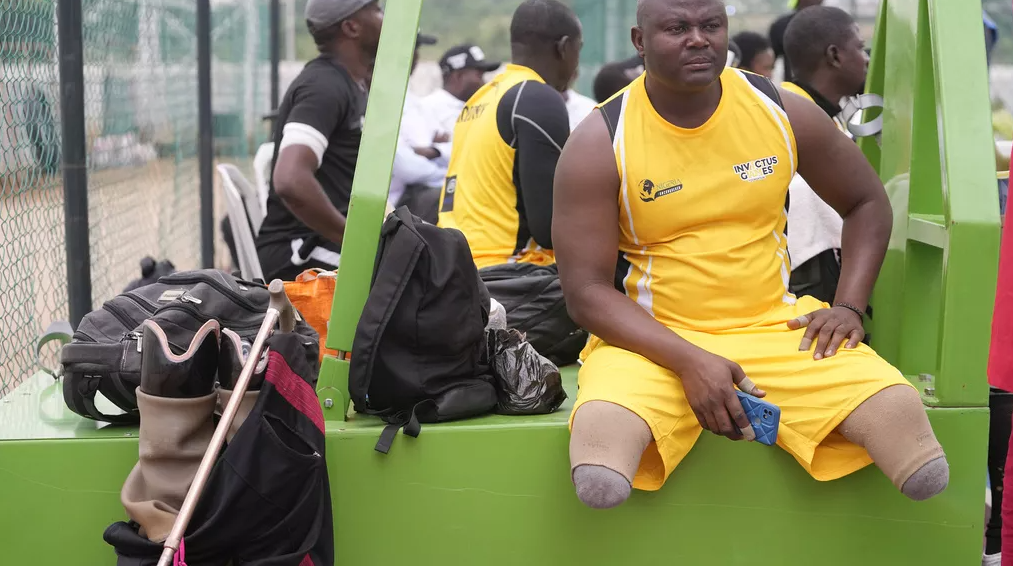Recovery Triumph: In the chilly evening of November 2020, a pivotal moment altered Peacemaker Azuegbulam’s life trajectory. A dedicated soldier serving his nation, Azuegbulam found himself amidst the tumultuous battlegrounds of northeastern Borno state, Nigeria. Tragically, an anti-aircraft weapon unleashed its fury upon his unit, shattering not only his physical being but also his aspirations. The aftermath left Azuegbulam with profound injuries, culminating in the amputation of his left leg—a grim conclusion to his cherished dream of a lifelong military career.
Yet, amidst the shroud of despair, a glimmer of hope emerged. Azuegbulam’s path to recovery intertwined with Nigeria’s participation in the Invictus Games—an international sporting event conceived by Prince Harry to honor wounded veterans and foster their rehabilitation. For Azuegbulam and his compatriots, the Games became a beacon of light in their darkest hours. Through grit and determination, Azuegbulam clinched Africa’s first gold medal at the Invictus Games, transcending physical limitations and reclaiming his sense of purpose.
Reflecting on his journey, Azuegbulam expressed profound gratitude for the transformative power of sports in his rehabilitation. “I thought I couldn’t meet up with life, but Invictus gave me an opportunity to recover through sports,” remarked the resilient soldier, echoing sentiments shared by many of his fellow wounded comrades.
Indeed, Azuegbulam’s story epitomizes the profound impact of sports on the healing process of Nigeria’s wounded servicemembers. Abidemi Marquis, the military’s director of sports, attested to the efficacy of the Invictus Games, noting a remarkable improvement in participants’ physical and psychological well-being. Against Nigeria’s protracted battle against extremism, the Games offer a holistic approach to recovery, complementing traditional rehabilitation efforts with the therapeutic benefits of sports.
The significance of sports in addressing the mental health crisis plaguing Nigeria’s military cannot be overstated. Lance Cpl. Dean Onuwchekwa, whose harrowing ordeal left him with debilitating injuries and profound psychological trauma, found solace and renewed purpose through his participation in the Games. Wrestling with post-traumatic stress disorder (PTSD), Onuwchekwa’s journey from despair to resilience underscores the invaluable role of sports in restoring hope and dignity to wounded warriors.
Sgt. Monday Peter’s testimonial further elucidates the transformative nature of the Invictus Games. Despite losing his legs in the line of duty, Peter found newfound confidence and vitality through adaptive sports. From sitting volleyball to basketball and swimming, Peter’s journey epitomizes the indomitable spirit of resilience cultivated on the fields of competition.
Beyond anecdotal accounts, empirical evidence underscores the therapeutic benefits of sports in veteran rehabilitation. Dr. Maymunah Yusuf Kadiri, a renowned mental health physician, elucidates how sports facilitate social integration, stress management, and enhanced self-esteem among wounded soldiers. For veterans grappling with the scars of war, sports offer a pathway to resilience and renewed purpose, fostering a sense of camaraderie and belonging amidst adversity.
Prince Harry’s connection to the plight of wounded veterans imbues the Invictus Games with profound significance. Drawing from his own struggles with PTSD following his military service, Prince Harry envisioned a platform where servicemembers could harness the transformative power of sports to reclaim their lives. Prince Harry has catalyzed a global movement through the Invictus Games, empowering wounded warriors to transcend their injuries and embrace a future defined by resilience and hope.
In Nigeria, Prince Harry’s visit to wounded soldiers at the Nigerian Army Reference Hospital underscores the enduring impact of the Invictus Games. Despite the formidable challenges facing Nigeria’s military healthcare system, wounded soldiers like Cpl. Iziogo Onyema and Sgt. Emmanuel Oyesigi finds solace in the camaraderie and support offered by the Games. However, the entrenched stigma surrounding prosthetics persists, highlighting the need for broader societal acceptance and support for wounded veterans.
A newfound sense of pride and resilience permeates the atmosphere at the officers’ mess in Abuja. Formerly burdened by shame and isolation, wounded soldiers now embrace their scars as badges of honor, a testament to their indomitable spirit and unwavering resolve. Azuegbulam aptly reflects, “After I got injured, it affected me mentally, emotionally, and physically. But today, I am living proof of resilience and hope.”
In conclusion, the journey of Nigeria’s wounded soldiers exemplifies the transformative power of sports in rehabilitation and recovery. Through the Invictus Games, these resilient men and women have transcended adversity, reclaiming their dignity and forging a brighter future. As Nigeria continues its fight against extremism, let us not forget the unsung heroes whose courage and resilience inspire us all.


















